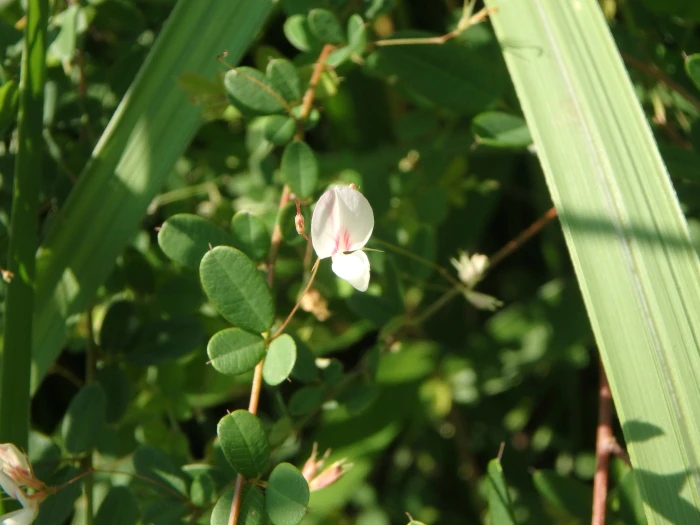Wand Lespedeza
/
(Lespedeza virgata)
Wand Lespedeza (Lespedeza virgata)
/

harum.koh
CC BY-SA 4.0
Image By:
harum.koh
Recorded By:
Copyright:
CC BY-SA 4.0
Copyright Notice:
Photo by: harum.koh | License Type: CC BY-SA 4.0 | License URL: http://creativecommons.org/licenses/by-sa/4.0/ | Rights Holder: harum.koh | Publisher: iNaturalist | Date Created: 2015-08-01T15:21:11-07:00 |














Summary
Lespedeza virgata, commonly known as Wand Lespedeza, is a deciduous shrub native to open woodlands and grasslands of East Asia and has become naturalized in various regions of North America. It typically grows to a height of up to 5 feet (1.5 meters) and is characterized by its upright, slender stems and fine-textured foliage. Wand Lespedeza produces small, pea-like, pink to purple flowers in late summer, which are moderately showy and attract pollinators. After flowering, it bears small legume pods.
Wand Lespedeza is valued for its adaptability to poor soils and its use in erosion control due to its extensive root system. It is also utilized as a forage plant for livestock and wildlife. In cultivation, it requires full sun to flourish and prefers well-drained soils, although it can tolerate a range of soil conditions. It is often planted in naturalized areas, meadows, and as a component in ecological restoration projects. While generally low-maintenance, it can spread aggressively in some conditions and may require management to prevent unwanted naturalization.CC BY-SA 4.0
Wand Lespedeza is valued for its adaptability to poor soils and its use in erosion control due to its extensive root system. It is also utilized as a forage plant for livestock and wildlife. In cultivation, it requires full sun to flourish and prefers well-drained soils, although it can tolerate a range of soil conditions. It is often planted in naturalized areas, meadows, and as a component in ecological restoration projects. While generally low-maintenance, it can spread aggressively in some conditions and may require management to prevent unwanted naturalization.CC BY-SA 4.0
Plant Description
- Plant Type: Herb, Shrub
- Height: 3-6 feet
- Width: 2-3 feet
- Growth Rate: Slow
- Flower Color: Purple
- Flowering Season: Summer
- Leaf Retention: Deciduous
Growth Requirements
- Sun: Full Sun, Part Shade
- Drainage: Fast, Medium, Slow
Common Uses
Bee Garden, Bird Garden, Butterfly Garden, Drought Tolerant, Erosion Control, Low Maintenance
Natural Habitat
Open woodlands and grasslands of East Asia
Other Names
Common Names: Slender Lespedeza, Slender Bush Clover
Scientific Names: Lespedeza virgata, Desmodium virgatum, Hedysarum virgatum, Hedysarum virgatum, Lespedeza nakaii, Lespedeza patentibicolor, Lespedeza patentihirta, Lespedeza swinhoei, Lespedeza virgata var. virgata
GBIF Accepted Name: Lespedeza virgata
